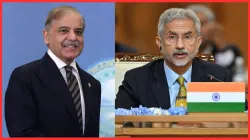SCO Summit: Pakistan PM Shehbaz Sharif's schooling on terrorism backfires after India's Jaishankar steps in
Shehbaz Sharif highlighted terrorism as a significant concern among member states of the Shanghai Cooperation Organisation. However, the Indian leader present at the meeting has shown the mirror to Pakistan which has been involved in cross-border terrorism for the past seven decades.

Astana: Pakistan Prime Minister Shehbaz Sharif on Thursday raised the issue of terrorism as a major concern for member states at the Shanghai Cooperation Organisation and called for “meaningful” engagement with the Afghan Taliban government. Shahbaz, who arrived in Kazakhstan’s capital of Astana on Wednesday for a two-day official visit, represented Pakistan at the SCO meeting where leaders and diplomats from countries including China, India, Turkiye, Iran, Azerbaijan, and Kyrgyzstan have gathered to discuss economic and security cooperation.
Sharif schools Afghanistan on terrorism
The prime minister, during his address, emphasised the importance of maintaining peace in the region as a precondition for economic development, Dawn News reported. “Achieving lasting peace in Afghanistan is a lynchpin to this common objective,” he said, adding that the international community "meaningfully engage with the Afghan government to meet their genuine economic and development needs”. Sharif also said the Afghan Taliban must also “take concrete measures” to ensure its soil is not used for terrorism against any other state.
“Terrorism in all its forms and manifestations, including state terrorism, must be condemned in clear and unambiguous terms,” he said, adding that there was “no justification for killing innocent people or using the bogey of terrorism” for political point-scoring. He also touched on the topic of globalisation and highlighted that leaders had the responsibility to rise above partisan geopolitics and join hands to secure a prosperous future for our people.
What happens when S Jaishankar steps in?
However, when India's External Affairs Minister S Jaishankar stepped in, he exposed Pakistan's use of terrorism against its neighbouring nation. Although when he was delivering his boss Prime Minister Narendra Modi's message, it was quite clear that the message was intended for Islamabad.
Representing PM Modi at the summit, he emphasised that priority must naturally be given to combating terrorism, one of the original goals of the SCO. "Many of us have had our experiences, often originating beyond our borders," PM Modi said. The Indian leader, in his staunch words, stressed that terrorism will not go unchecked so that the issue could become a global threat."Let us be clear that if left unchecked, it can become a major threat to regional and global peace. Terrorism in any form or manifestation cannot be justified or condoned. The international community must isolate and expose those countries that harbour terrorists, provide safe havens and condone terrorism," he said.
The Prime Minister underscored that cross-border terrorism needs a decisive response. "Cross-border terrorism requires a decisive response and terrorism financing and recruitment must be resolutely countered. We should also take proactive steps to prevent the spread of radicalization among our youth. The Joint Statement issued during India’s Presidency last year on this subject underlines our shared commitment," he added.
Shehbaz advocates national currency for trade
Regarding Pakistan’s role in regional trade connectivity, the premier said the country’s location made it an “ideal trade conduit” for the region and added that the China-Pakistan Economic Corridor (CPEC) supplemented “SCO’s vision of regional connectivity and economic interaction”. Shehbaz also advocated for the promotion “of national currencies for mutual settlements within the region” to avoid “global financial shocks”.
He said alternative funding mechanisms would “give impetus to different development projects in the SCO region”. The prime minister said Pakistan would do “its utmost to provide impetus to collective efforts to raise living standards in the SCO region” while talking about the rise in political and military conflicts across the globe and consequent hike in food and fuel prices, which have “seriously affected members’ ability to address poverty”. Pakistan and India became a member of SCO in June 2017 at a summit in Kazakhstan.
Recalling how Pakistan and Russia used to have a bilateral trade and a barter system in the 1950s and 1960s, Shehbaz, on Wednesday, during his interaction with Russian President Vladimir Putin at the sidelines of the summit, called for overcoming financial and banking issues between the two countries by renewing and expanding trade under a barter system. “I think today is the time we can overcome financial and other banking issues by renewing our trade and expanding our trade under a barter,” Shehbaz told Putin. “That will be very beneficial to Pakistan and we will be able to overcome many problems.”
Putin said both countries could enhance their cooperation in energy and agriculture and expressed his readiness to promote cooperation with cash-strapped Pakistan in the field of food security. Meanwhile, Shehbaz also proposed to establish tripartite institutional mechanisms, particularly in economic and investment areas to strengthen Pakistan-Turkiye-Azerbaijan economic and commercial cooperation.
(With inputs from agency)